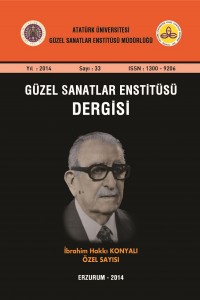Abstract
Mehmet Vani Efendi starts to live in Erzurum after having long education period. He takes the attention of the public and the administrators by his prayers. Then he is invited to İstanbul. He is able to talk with Sultan Mehmed IV in his private office and gives various courses to his sons. The Sultan gives him some property in Vanikoy which is a district of İstanbul and in Kestel which is a district of Bursa. Vani Efendi has mosques built in Erzurum, İstanbul and Kestel. He was exiled to Kestel due to the failure of Vienna Siege II. He died in Kestel in 1685 and was buried near his mosque there. Vaniköy in İstanbul is given the name of Mehmed Vani Efendi today. He also produced very interesting prose works in his life time. Especially his ideas on Turks make him a distinguishable personality in the field of Turkish education
Keywords
Abstract
Mehmet Vani Efendi, uzun bir tahsil hayatından sonra Erzurum'a yerleşir. Burada verdiği vaazlarla halkın ve yöneticilerin dikkatini çeker. İstanbul'a çağrılır. Padişah IV. Mehmed'in huzur sohbetlerine katılır ve şehzadelere hocalık yapar. Padişah tarafından kendisine İstanbul Vaniköy ve Bursa'nın Kestel İlçesinde araziler verilir. Vani Efendi Erzurum, İstanbul ve Kestel'de birer cami yaptırır. Bunlarla birlikte İstanbul ve Kestel'de medrese, ev, yalı vb yapılar inşa ettirir. II. Viyana Kuşatması'nın başarısız olması sonucu Padişah tarafından Kestel'e sürülmüştür. 1685 yılında Kestel'de vefat eder ve yaptırdığı camisinin yanına defnedilir. Günümüzde İstanbul'da Vaniköy semtine adını veren Mehmed Vani Efendi, yazmış olduğu eserler ile de dikkati çeker. Özellikle Türkler hakkındaki düşünceleri ilim camiası içerisinde Ona haklı bir ayrıcalık kazandırır.
Keywords
Details
| Primary Language | tr;en |
|---|---|
| Journal Section | Articles |
| Authors | |
| Publication Date | June 9, 2015 |
| Submission Date | June 9, 2015 |
| Published in Issue | Year 2014 Issue: 33 |
Obtaining permissions for studies requiring ethics committee approval regarding the implementation of ethical rules and including information about permission in the article was added to the criteria. In this direction, Ethics Committee Permission is required for articles submitted to our journal and meeting the conditions stated below.
• Any research conducted with qualitative or quantitative approaches that require data collection from participants using questionnaires, interviews, focus group work, observation, experimentation, and interview techniques.
Also;
• Obtaining and indicating permission from the owners for the use of scales, surveys and photographs belonging to others,
• It should be stated that the copyright regulations are complied with for the intellectual and artistic works used.


